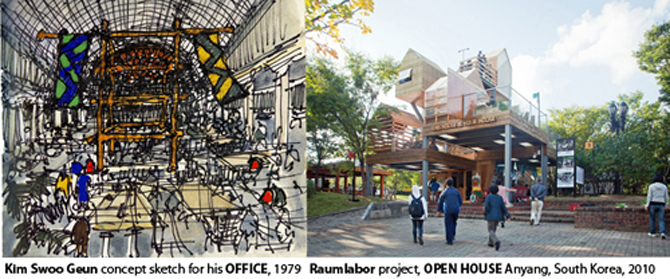Who Activates Cultural Space Today? A Seoul - Berlin Dialogue
Friday, 20 May 2011
On the occasion of the opening of the Aedes exhibition Dense Modernities: Kim Swoo Geun

On the occasion of the opening of our exhibition on renowned Korean architect and cultural figurehead Kim Swoo Geun (1931-1986), and in the presence of his daughter, Aedes celebrates the remarkable cultural commitment of this individual and asks who his present-day equivalents might be, in Seoul and in Berlin: the former city recognised for its deep yet dynamic cultural formations and the latter as one of the world’s hothouses for emerging culture in all fields? How is culture thought of, defined and activated today? By whom and using which mechanisms? What is its infrastructure, its political role and its local significance?
The short career of Kim Swoo Geun spanned three political regimes and consequently three distinct periods of building projects manifesting the ideologies of each of these regimes. Kim Swoo Geun built many of these major projects, becoming the most influential 20th century architect in Korea. His premature death left behind another equally influential legacy as tireless advocate, connoisseur and patron of Korean arts, both traditional and avant-garde, whose activities laid the foundation stones for the rich and complex culture of Korea today.
PROGRAMME
Welcome
Hans-Jürgen Commerell ANCB Director
Introduction to Kim Swoo Geun
Prof. Pai Hyungmin University of Seoul
tatements on Cultural Commitment
Matthias Rick architect, Raumlabor, Berlin
Olivia Plender artist, Berlin
Moderated Discussion on Activating Culture Today
with moderator: Luis Berríos-Negrón artist and architect, Berlin
BIOGRAPHIES
Hyungmin Pai studied architecture and urban design in Seoul National University and received his Ph.D from the History, Theory, and Criticism program at MIT. He is professor at the University of Seoul and twice Fulbright Scholar. His writings include the The Portfolio and the Diagram (MIT Press, 2002) and Sensuous Plan: The Architecture of Seung H-Sang (Dongnyok, 2007) He was curator for the Korean Pavilion at the 2008 Venice Biennale and presently Head Curator for the 4th Gwangju Design Biennale.
Matthias Rick is co-founder of raumlabor, a Berlin-based network-collective of 8 architects, whose work focuses on issues of urban transformation and urban renewal. Tailoring a team of expert collaborators from a range of disciplines and field for each project, raumlabor stands for discourse-oriented, experimental, joyful, participatory working methods with a high degree of public engagement and strong design expression. raumlabor has received several prizes and awards. Matthias Rick has been Professor of Architecture at the Academy of Arts, Architecture and Design (VSUP) Prague since 2009.
Olivia Plender is an artist based in Berlin. Her research-based practice interrogates the ideological framework around the narration of history and, more recently, changing attitudes to education and value in the contemporary knowledge economy. In an installation for Altermodern: Tate Triennial 2009, Tate Britain, she focused on the Kibbo Kift Kindred; a British youth movement existing between 1920-1951, who were radicalised during the economic crisis of the 1930s into a nationalist monetary reform movement. A touring curatorial project There is No Alternative (TINA), explores the effects of the financial system on the realm of representation in the format of a group exhibition, with an upcoming publication.
Luis Berríos-Negrón is a Berlin-based artist focusing on visual arts, material economies and mass customization, all through the lens of architecture. He holds a Master of Architecture from the Massachusetts Institute of Technology, and Bachelor of Fine Arts from the Parsons School of Design. He has received various awards, including the Parsons-Kalil Award for Smart Design and the MIT-Schnitzer Award for the Visual Arts. He recently co-founded The Anxious Prop, and is now Researcher (wissenschaftlicher Mitarbeiter) in Professor Almut Grüntuch-Ernst's teaching unit at the Architecture, Civil Engineering, and Environmental Sciences Department of the Technische Universität Braunschweig.

